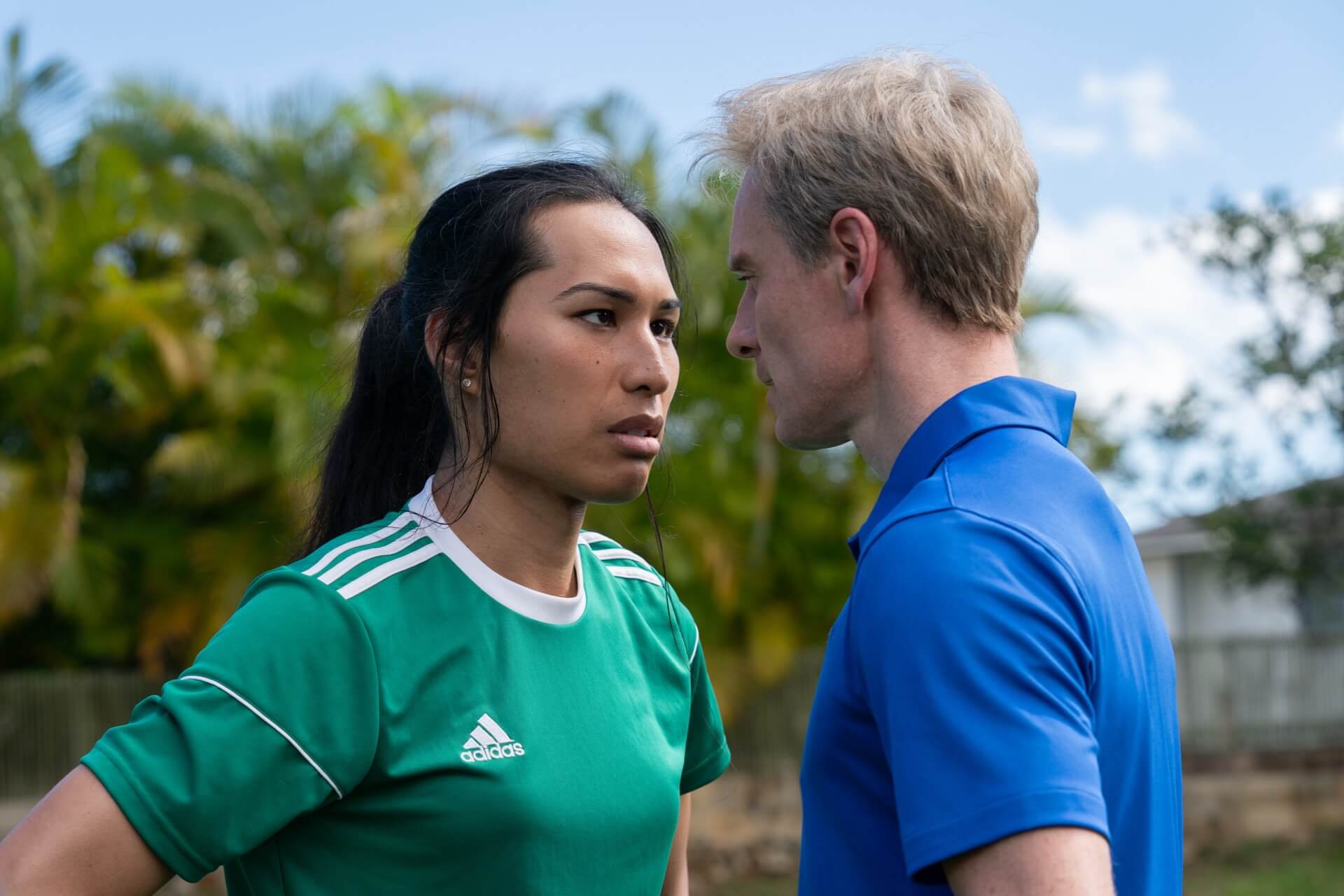Apr 30, 2024 Film & TV
It struck me recently that Taika Waititi has been a major fixture in New Zealand culture for more than 20 years. When I was 13, I watched as Two Cars, One Night, the director’s triumphant short film and early calling card, went up for the Best Live Action Short Film award at the 2005 Academy Awards. The Oscar ultimately went to Andrea Arnold’s similarly brilliant Wasp, but Two Cars must’ve given it a run for its money. At the ceremony, the camera drifts along each nominated director, as they smile and awkwardly nod at the camera. Then it moves to Waititi, who is pretending to be asleep in his chair. He jerks awake as his name is read. Next to him, upcoming New Zealand heavyweights Loren Taylor (whose debut The Moon Is Upside Down is currently earning raves and winning awards overseas) and Ainsley Gardiner (who would go on to produce Cousins, Red, White and Brass and Boy) grin and laugh. It’s a gleefully surprising, authentically Kiwi moment among all the stuffy formality of the Hollywood glitz mill.
From there, Waititi was a source of excitement in New Zealand — think back to his directorial and screen contributions to Flight of the Conchords, an HBO show which was both a love letter to Aotearoa’s many quirks and a nearly universally recognised very funny TV programme. As Waititi’s stature grew, the New Zealand film industry re-formed with it — where we’d earlier been known for dark, gothic drama or splatter-gore horror, we increasingly became known for gentle, quirky dramedy, for telling human stories that (generally) managed to balance their laughs with teary-eyed heartstring tugging.
This all peaked with Hunt for the Wilderpeople in 2016, a major transitional moment for Waititi, after which he moved from low-key New Zealand festival offerings to (relatively) big-budget crossover hits. As I watched it in New Zealand, it did nothing for me. When I moved abroad, and it arrived on overseas screens, I caught it again and cried several times. There is something about Waititi’s brand of humour that fits New Zealand like a glove, and in those humble days, it felt like a bountiful care package for a homesick traveller.
That all feels like a long time ago now. The initial, joyous shock that this very Kiwi brand of humour actually translates overseas (as seen in the runaway success of Thor: Ragnarok in 2017) has dimmed. Waititi is a director (and actor) of international stature at this point — he’s won an Oscar for Jojo Rabbit; he’s starred in massive, mostly awful films and series like Free Guy and The Mandalorian, and provided his voice for Lightyear. He has lent his stature to the producing of important indigenous series and films like Reservation Dogs and Night Raiders. He is very much embedded in the Hollywood system, which has boosted his profile — much like Peter Jackson’s elevation years earlier. Along the way, Waititi became one of the few directors in the Marvel stable who has managed to leverage the success of those films to make original work within the Hollywood system — the aforementioned Jojo Rabbit, and now Next Goal Wins, which arrives after significant delays caused by both Covid and the recasting of actor Armie Hammer.
Waititi’s modus operandi during his Hollywood era has been to maximise the ‘New Zealandness’ of his work on a grander scale than we’re accustomed to; the once-unorthodox approach to his comedy is now a central, accessible tenet. In Next Goal Wins, Waititi turns his eye towards the Pacific, and to indigenous peoples once more, adapting a 2014 documentary of the same name that explored the trials and tribulations of the American Samoan soccer team, famous for being on the bad side of the largest goal margin in international football history when they lost to Australia 31–0 during a FIFA qualifying match.
Attempting to turn their luck around, the team rope in down-in-the-dumps coach Thomas Rongen, grieving a family loss and disgraced in the larger football world for poor performance, to try to upskill them to the point where they can score a single goal. Though initially resistant to the slow pace and hopeless disorganisation of the team, Rongen soon learns that not only can he fix the team’s fortunes, the team can fix him. Waititi’s film stars Michael Fassbender as Rongen, alongside an ensemble of Māori and Pasifika actors, including Oscar Kightley, David Fane, Beulah Koale, Kaimana, Rachel House, Uli Latukefu, and also-ran Pālagi played by Elisabeth Moss, Will Arnett and Rhys Darby.
At the New Zealand premiere, both the actors in attendance and Waititi, via video message, underlined the fact this is ‘Taika’s version’ of the story — not a direct adaptation. Certain broad concessions have been made to ensure the narrative is unmistakably of Waititi’s signature blend. He appears at the very top of the film, as the narrator, a ‘wacky’ take on a faifeau, or Samoan minister, which feels a little too close to a parody of Samoan culture for comfort. Nevertheless, it’s an indication — how you feel about this opening will largely establish how you feel about the rest of the picture.
The critical consensus around Next Goal Wins is that, well, it’s not very good — a verdict I agree with — and that it may mark a second crossroads for Waititi as a filmmaker. It’s the third Waititi effort that has descended into the valley of ‘not good’, following the half-assed superhero sequel Thor: Love and Thunder (2022) and Jojo Rabbit (2019), a film that, Oscar and all, is an upsettingly misguided attempt to quirk up the Nazis, an anti-hate satire that is not satirical at all, and one that, as critic Esther Rosenfield wrote in her definitive essay ‘My Final Words on Jojo Rabbit’, is a film “for self-satisfied liberals who want to be told they are good people for holding their milquetoast ideas about diversity and acceptance”. Next Goal Wins, by comparison, is merely an okay film — everything about the film’s existence is a capitulation to the middle ground.
The operative word for Next Goal Wins is ‘mild’: its drama is mild, its depiction of Samoan culture is mild, its emotional core is mild, its filmmaking is mild, its comedy is mild. Nothing in Next Goal Wins is designed to raise a pulse, with the notable exception of a single comic beat in which a minor character is suddenly hit by a bus, and a misguided subplot that centres on Rongen and Kaimana’s Jaiyah Saelua, a fa‘afafine who becomes the first trans person to play in a World Cup qualifying match. This includes a scene where Rongen deadnames Jaiyah, and another where he asks her what’s going on ‘down there’. The interplay is designed to exemplify Rongen’s slow transition from alcohol-soaked resentment of his new island location to his eventual acceptance and embracing of the place and its people. This is not to say that there isn’t a place in drama for characters who are complex, and whose complexity manifests as transphobia, but Next Goal Wins’ ambitions are so middlebrow that any genuine exploration of this issue is swept away in the warm, easy flow of Waititi’s direction.
The film that Next Goal Wins most clearly aspires to is Cool Runnings, the iconic (and not especially good) 1993 comedy about the Jamaican bobsledding team that you probably watched in class at intermediate in the weeks before Christmas. Not exactly the mountaintop of cinema — and that’s okay; if Waititi’s vision for his films is, ultimately, absolute harmlessness, he should be allowed to enact that. Where it becomes a problem is the general dearth of films about Samoans or any Pasifika peoples, particularly on the scale this film enjoys. There’s also the fact that Waititi is (with Jane Campion and Jackson) one of New Zealand’s most internationally significant working filmmakers. Undeniably, Waititi enjoys the admiration and fandom of much of the country — any new film by the filmmaker inadvertently becomes a piece of cinema by which New Zealanders measure themselves. That being so, I long for a little more ambition from Waititi, for a return to the roots that made Two Cars One Night — still his finest achievement, in my eyes — such a watershed moment.
Cinematically, it feels as though Waititi has switched off: the film is flatly shot, with only fleeting references to the clever framing and editing of Waititi’s earlier films. The comedy, particularly in the film’s first half, is low effort and watery. There are some ancient pop-cultural references, including one to Liam Neeson’s Taken monologue, which feel like gags that would be left discarded on the cutting-room floor of superior Waititi comedies like What We Do In the Shadows. The cast are uniformly giving it their all — Fassbender, who feels initially miscast, eventually finds a genuine emotional register that makes for an effective climactic monologue towards the end of the film, while the Pasifika actors, particularly national treasure Kightley as the team’s manager, Latukefu as legendary goalie Nicky Salapu and especially Kaimana, work hard to imbue their characters with a dignity that Waititi and co-writer Iain Morris’ script does not afford them. In the attempt to present Rongen’s initial perspective, that the American Samoan people are simple-minded hicks, the film comes dangerously close to suggesting the same thing.
Some Pasifika creatives I’ve spoken to since the screening felt that the film reduced many of its Pasifika characters to caricatures — including in the scenes with the team’s Tongan rivals, who recall Dodgeball’s Purple Cobras in their cartoonish villainy. It makes for some genuinely funny moments, as when the warring teams attempt to intimidate each other by making hissing noises and kissy faces (it makes more sense in the context of the film, somehow), but the depiction is otherwise so surface level that I wouldn’t be surprised if, by and large, Tongan viewers found a lot less to laugh about.
With Next Goal Wins, Waititi seems to be positioning himself as a figurehead of pan-Pasifika storytelling — if that’s the case, given how content the film is to coast, the label seems presumptuous, the storytelling authority misused. For a lot of filmmakers, there comes a time when what has worked in the past starts to feel like schtick, and increasingly this is the case with Waititi. Next Goal Wins, for all its unwillingness to make loud points, makes one thing abundantly clear: it’s time for New Zealand’s most beloved son to make a pivot.






